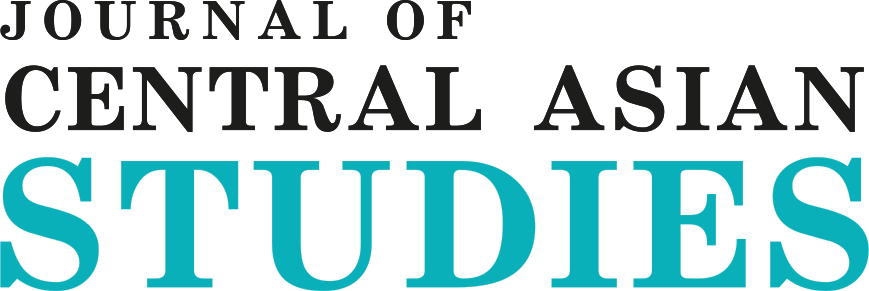Этникалық бірегейлік: Орталық Азия ғалымдарының зерттеулері
DOI:
https://doi.org/10.52536/3006-807X.2024-4.003Кілт сөздер:
этникалық сәйкестік, глобализация, дін, тіл, этникаАңдатпа
Жаһандану этникалық бірегейліктің кейбір аспектілерін өзгертті. Бұл мақалада теориялық негізде Орталық Азия ғалымдарының этникалық бірегейлікті зерттеуге қатысты жүргізілген еңбектері талданады. Жаһандану және әлеуметтік-саяси сілкіністер ахуалында этникалық бірегейлікті сақтау және дамыту осы зерттеудің негізгі тақырыбы болып табылады. Этникалық бірегейлікті анықтаудың түрлі зерттеу тәсілдері, оның қалыптасуының негізгі кезеңдері, этникалық бірегейліктің қалыптасуы мен өзгеруіне саяси, тарихи және әлеуметтік-мәдени процестердің әсері қарастырылады. Антропология, саясаттану, әлеуметтану және психология сынды түрлі ғылым салаларының зерттеулеріне сүйене отырып, мақала этникалық бірегейлікті қалыптастырудың күрделі мәселелерін, оның мәні мен жеке адамдар мен қауымдастықтарға ықпалын зерттейді. Scopus деректер базасындағы «ethnic identity» кілт сөзімен индекстелген 17 ғылыми жұмыстың деректеріне сүйене отырып, мақалада этникалық бірегейлікті қалыптастыру мен түсінуге ықпал жасайтын негізгі факторлар анықталады. Автор этникалық тиістілікті зерттеудің түрлі тәсілдерін жинақтап, этникалық бірегейліктің қалыптасуына ықпал жасайтын факторларды талдайды, Орталық Азия зерттеушілерінің негізгі тұжырымдарын ұсынады. Эмпирикалық зерттеулер, теориялық негіздерді синтездеу және нақты жағдайларды талдау арқылы мақала аймақтағы этникалық бірегейліктің көп қырлы табиғатын түсінуге шақырады. Мақала этникалық бірегейліктің саясаттану, мәдениеттану және әлеуметтанулық аспектілерін зерттеуге маңызды үлес болып табылады және осы саладағы қосымша зерттеулер үшін пайдалануға болады. Біздің зерттеу этникалық бірегейлік пен тарихи-саяси контексттің өзара тәуелділігін айқындап, осы факторлардың қазіргі әлеуметтік шынайылықты қалай қалыптастыратынын көрсетті. Зерттеу нәтижелері этникалық бірегейлікті тұтастай қарастыру құндылығына көңіл бөледі және Орталық Азиядағы әлеуметтік тұтастық пен мәдени сабақтастықты ілгерілету парадигмасын ұсынады.
Әдебиеттер тізімі
Abdoubaetova, A. (2023). Making sense of conservative narratives in Kyrgyzstan: the case of illiberal public activists. East European Politics, 39(2), 281–300. https://doi.org/10.1080/21599165.2022.2084078
Abdullaev, K. (2012). Nomad migration in Central Asia. In J. Cribb & G. Herrmann (Eds.), After Alexander Central Asia before Islam (pp. 73–98). London, British Academy. https://doi.org/10.5871/bacad/9780197263846.003.0004
Agadjanian, V., & Nedoluzhko, L. (2022). Imperial legacies, nation building, and geopolitics: Ethno-regional divides and the Russian language in Central Asia. Ethnic and Racial Studies, 45(10), 1846–1872. https://doi.org/10.1080/01419870.2021.1981966
Aitpaeva, G. (2008). Kyrgyzchylyk: Searching new paradigms for ancient practices. Anthropological Journal of European Cultures, 17(2), 66–83. https://doi.org/10.3167/ajec.2008.170205
Anderson, B. (2016). Imagined communities: Reflections on the origin and spread of nationalism. London, Verso.
Baigabatova, N., Tolamissov, A., Rakhipova, S., Ashimova, D., Khuangan, O., & Smagulov, K. (2018). Ethnocultural identity of Kazakhs of Mongolia in everyday life. Codrul Cosminului, 24(1), 79–96.
Balci, B. (2007). Central Asian refugees in Saudi Arabia: Religious evolution and contributing to the reislamization of their motherland. Refugee Survey Quarterly, 26(2), 12–21. https://doi.org/10.1093/rsq/hdi0223
Bayarkhuu, D. (2004). Geopolitics of the new Central Asia. World Affairs: The Journal of International Issues, 8(1), 53-76.
Botokanova, G., Alybaev, A., & Mursahmedova, G. (2024). Transformation of the consciousness of post-nomads in the context of globalization. Trans/Form/Acao, 47(2), e0240085. https://doi.org/10.1590/0101-3173.2024.v47.n2.e0240085
Boivin, N. (2015). Peripheral ritualized practices - threads connecting decorations to the cloak of identity. Journal of Intercultural Communication Research, 44(1), 44–63. https://doi.org/10.1080/17475759.2014.1003391
Brubaker, R. (2002). Ethnicity without groups. European Journal of Sociology, 43(2), 163-189. https://doi.org/10.1017/S0003975602001066
Brubaker, R. (2006). Ethnicity without groups. Cambridge, Harvard University Press.
Czuba, K. (2023). Political mobilization of layered ethnic identities. Ethnic and Racial Studies, 46(10), 2138-2162. https://doi.org/10.1080/01419870.2022.2154614
Dave, B. (2007). Kazakhstan - ethnicity, language and power. London, Routledge.
Fahrutdinova, G., Ibrayeva, Z., & Bulatbayeva, K. (2023). Development of multicultural education in Tatarstan and Kazakhstan. Education and Self Development, 18(3), 184–201. https://doi.org/10.26907/esd.18.3.12;
Faranda, R., & Nolle, D. B. (2011). Boundaries of ethnic identity in central Asia: Titular and Russian perceptions of ethnic commonalities in Kazakhstan and Kyrgyzstan. Ethnic and Racial Studies, 34(4), 620–642. https://doi.org/10.1080/01419870.2010.516004
Fierman, W. (2006). Language and education in post-Soviet Kazakhstan: Kazakh-medium instruction in urban schools. The Russian Review, 65(1), 98-116. https://doi.org/10.1111/j.1467-9434.2005.00388.x
Geertz, C. (1973). The interpretation of cultures: Selected essays. New York, Basic Books.
Gharibiyan, Z. (2015). Designing a model for measuring the amount of young individuals’ national identity. Social Sciences (Pakistan), 10(7), 1669–1676.
Hall, S. (1996). Cultural identity and diaspora. In P. Mongia (Ed.), Contemporary postcolonial theory: A reader (pp. 110-121). London, Arnold.
Hirsch, F. (2000). Toward an empire of nations: Border-making and the formation of Soviet national identities. The Russian Review, 59(2), 201-226. https://doi.org/10.1111/0036-0341.00117
Kappassova, G. M. (2018). Migration policy of the regions of the Republic of Kazakhstan: Socio-political mechanisms of easing the interethnic tension. Space and Culture, India, 5(3), 69–88. https://doi.org/10.20896/saci.v5i3.279
Kaziev, S. Sh., Mogunova, M. V., & Kusainov, O. Zh. (2023). North Kazakhstan region: A cult of saints and ethnic identity processes among Kazakhs. Oriental Studies, 16(6), 1572-1586. https://doi.org/10.22162/2619-0990-2023-70-6-1572-1586
Khomyakov, M. B. (2020). Nationalism and colonialism: Oceans, civilizations, races. Changing Societies and Personalities, 4(3), 285–303. https://doi.org/10.15826/csp.2020.4.3.102
Lubin, N. (2023). Islam and ethnic identity in Central Asia: A view from below. In Y. Ro’I (Ed.), Muslim Eurasia: Conflicting Legacies (pp. 53–70). London, Routledge. https://doi.org/10.4324/9781003417088-5
Marat, E. (2018). The politics of police reform: Society against the state in post-Soviet countries. Oxford, Oxford University Press.
Matkerim, D., Ismagambetova, Z., Edelbay, S., Karabayeva, A., & Boldykov, Z. (2023). Symbolic images representing cultural and ethnic identity of the Kazakhs in Kazakhstan cinema. ISVS e-journal, 10(11), 373–389. https://doi.org/10.61275/ISVSEJ-2023-10-11-24
Mukhamejanova, D., & Konurbayeva, Z. (2023). Diaspora engagement and return migration for educational purposes in Estonia and Kazakhstan. International Journal of Comparative Education and Development, 25(2), 123–135. https://doi.org/10.1108/IJCED-07-2022-0055
Murzakhmedova, G., Botokanova, G., & Zhunushalieva G. (2024). Methodological approaches to the study of the Kyrgyz Epic. Southern Semiotic Review, 19, 45–65. https://doi.org/10.33234/SSR.19.4
Myong, S.-O., & Chun, B.-S. (2015). The cultural politics of restoring ethnic identity: Focusing on renaming of streets in Almaty. International Journal of Critical Cultural Studies, 13(2), 1-11. https://doi.org/10.18848/2327-0055/CGP/v13i02/43765
Nasritdinov, E. (2016). Only by learning how to live together differently can we live together at all: Readability and legibility of Central Asian migrants presence in urban Russia. Central Asian Survey, 35(2), 257–275. https://doi.org/10.1080/02634937.2016.1153837
Nurgaliyeva, A., Tastaeva, Z., Baibulsinova, A., & Serikova, L. (2017). The Fire Cult and Islam in the Kazakh system of beliefs. Trames, 21(2), 151–160. https://doi.org/10.3176/tr.2017.2.04
Otpenov, N., Smagulov, K. N., Al’muhametov, A. R., Akimhanov, A., & Anarbaiev, N. (2019). Ethno-confessional conflict as a destructive way to resolve contradictions in social and religious relations. European Journal of Science and Theology, 15(2), 179–189.
Rakhmetova, A., Ayapbergenov, B., Karbozova, G., & Temirgazina, Z. (2022). How much language is important for ethnic identity of young Kazakhstanis from inter-ethnic families? Journal of Siberian Federal University - Humanities and Social Sciences, 15(11), 1573-1584. https://doi.org/10.17516/1997-1370-0937
Reeves, M. (2014). Border work: Spatial lives of the state in rural Central Asia. Ithaca, Cornell University Press.
Senggirbay, M. (2019). Ethnic identity of Kazakhstani Russians: The dynamics of change and the place of Russia as a kin state. Journal of Nationalism Memory and Language Politics, 13(1), 67-89. https://doi.org/10.2478/jnmlp-2019-0004
Shapoval, Y. (2020). The role of Catholicism in the preserving of ethnic identity of deported poles: Case study Kazakhstan. Istoriya, 11(7), 93. https://doi.org/10.18254/S207987840010706-5
Shnirelman, V. A. (2012). Archaeology and the national idea in Eurasia. In C. W. Hartley, G. B. Yazicioğlu, & A. T. Smith (Eds.), The archaeology of power and politics in Eurasia: Regimes and revolutions (pp. 15–36). Cambridge, Cambridge University Press. https://doi.org/10.1017/CBO9781139061186.003
Smith, A. D. (1991). National identity. Reno, University of Nevada Press.
Smith, A. D. (2009). Ethno-symbolism and nationalism: A Cultural approach. Routledge. https://doi.org/10.4324/9780203876558
Torun, N. (2021). Soviet nationality policy: Impact on ethnic conflict in Abkhazia and South Ossetia. Karadeniz Araştırmaları, XVIII(70), 245-263.
Yefremov, Ye. A. (2021). Influence of the multiethnic environment on the diasporic identity of Koreans in Kazakhstan. Vestnik Sankt-Peterburgskogo Universiteta Vostokovedenie i Afrikanistika, 13(4), 519–529. https://doi.org/10.21638/spbu13.2021.404
Жүктеулер
Жарияланды
Журналдың саны
Бөлім
Лицензия
Авторлық құқық (c) 2024 Насимов М.

Бұл жұмыс Creative Commons атрибуты бойынша лицензияланған. 4.0 Халықаралық лицензия.










 Open content is licensed under the CC-BY
Open content is licensed under the CC-BY 